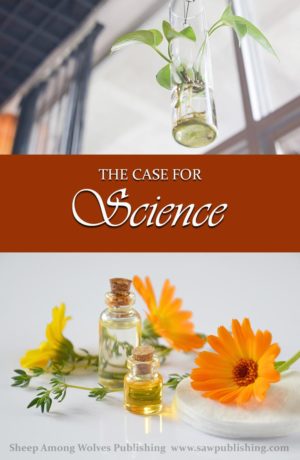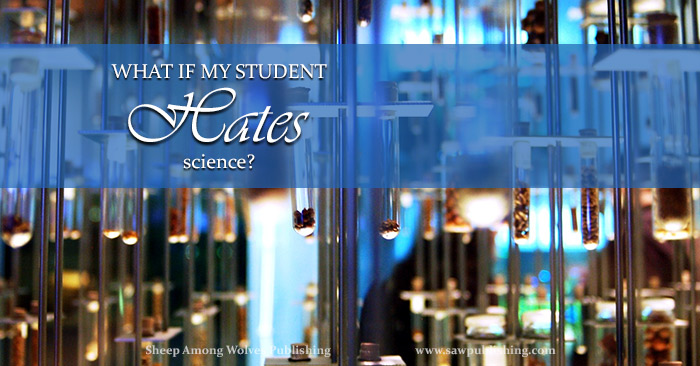The Case for Science
 Today we’re ready to tackle our next-to-last “case for . . .” post—the case for science.
Today we’re ready to tackle our next-to-last “case for . . .” post—the case for science.
Science and I had a somewhat comical relationship throughout my school days. It wasn’t exactly science’s fault. But our homeschooling schedule just happened to include a rotating period, where we had history one day and science the next.
I was a passionate history buff. (Was? Okay, let’s be honest—still am!) Therefore science, by default, turned into “that-other-subject-that-robs-us-of-history-class.” Unfair? Yes, I know. However, lamentably, also a fact. Today I want to take a more positive look at my childhood history-rival. I want to examine the case that really does exist for keeping science in our school curriculum.
 1) Science Encourages Independent Thought
1) Science Encourages Independent Thought
When you think about the fact that education focuses so heavily of the development of the mind, it is amazing how easy it is to learn—and yet not to think!
Maybe it’s the pressure of constant incoming information. Maybe it’s the structure of our teaching methods. Maybe it’s just that the human brain needs training before active, critical thought becomes a natural pattern. Whatever the cause, independent thought is a valuable skill that most students need encouragement to achieve.
Science, at a professional level, depends heavily on this ability to think clearly, vigorously, and without undue pressure from the paradigm of status quo. Students that are taught to approach science from this standpoint during their school years will start in life with greater clarity, vigour, and independence of thought, as well.
2) Science Develops Observation
There is so much that goes on in our world, that we miss! Not because it happened on the other side of the globe. Not because it happened at a microscopic level invisible to the naked eye. But simply because learning to observe—like learning to think critically—is a skill that needs practice and development.
Science—especially science experiments—prompts a student to observation.
What actually happened? Did you notice that little change in detail? What if we moved this crucible further from the source of heat?
Science experiments develop a student’s observational powers, creating habits of “noticing” that will carry over to many other areas of life.
3) Science Defends the Faith
I’ve put this third, not because it is the weakest argument, but because it is the strongest. In the past, there have been eras where familiarity with scientific principles did not play heavily into current Christian topics.
This cannot be said of our present day!
Christianity and science are continually being pitting against each other—and yet in actual fact, they are not enemies, but co-supporters. Teaching students to embrace scientific study on topics relevant to Christianity will equip them to defend their faith with confidence, as they reach out into the larger world around them.
If you are looking for resources to help you in this area, www.creation.com is a great place to start!
Runner-Up Argument: Science is Hands-On
Possibly I should qualify this, and say, “Science can be hands-on.” There are science programs that do not focus heavily on experiments. My very favourite science book from my own high school years did not (to the best of my memory) contain a single experiment at all. That was perfect for my learning style, but for many other students it could have been a drawback.
A hands-on science curriculum is a great way to open doors for a student who struggles with the traditional sit-still-with-a-textbook model. And happily, science is one of the subjects that lends itself most readily to hands-on learning. Because at the end of the day, the things we know about science are the things other people found out—by hands-on exploration.
My Verdict on the Case for Science
Actually, when you come to think of it, there really is a pretty strong case for science, even when it cheats you out of history class, every other day!
It may not be a “three r’s” subject, but it plays a vital role in our world today. Yes, there is a case for science! And in my opinion, it’s a compelling one.
So now you’re excited about science, but what if you student still isn’t? See our previous post:

Writing hasn’t always been part of the standard school curriculum. In a generation that is progressively de-valuing the ability to write, maybe we all need to take another look at the case that backs it up.

Are you looking for a high school poetry course that will make your student a better person as well as a better poet? What about a course that’s built around classic Christian hymns?

When I completed my first draft, As the Heavens Are Higher did not include Richard’s pet squirrel. By the time I sent the final manuscript to print, he starred prominently in the opening scene. Here’s the story of how Rufus became part of the novel.

